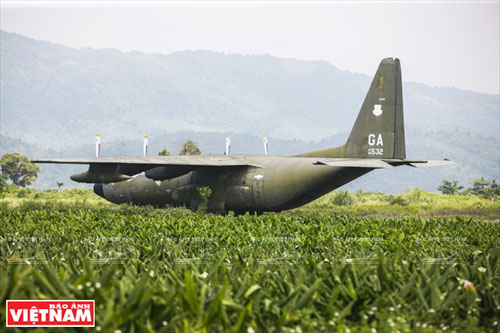Located in Tan Hop Commune, Huong Hoa District, Quang Tri Province, Ta Con Airport Relic is a demonstration of the Vietnamese people’s desire for unification of the country.

A corner of Ta Con relic site in Tan Hop Commune, Huong Hoa District, Quang Tri Province
During the war against the US, Ta Con’s entrenched fortification was the core of the electronic barrier system known as the McNamara line. The McNamara line was built by the US in June 1966 to detect the movement and infiltration of the People’s Liberation Armed Forces of South Viet Nam (PLAF). Built with billions of US dollars, the McNamara line was only in operation for two years and was dismantled in 1968 when PLAF won the Battle of Khe Sanh.
After 40 years, there are still many war remnants such as airplanes, tanks, artillery and bombs in Ta Con Airport Relic.
Military installations including trenches and military camps of the US military have also been restored to enable visitors to visualize the scale and severity of the war.
In front of the entrance, the local authority has built a small museum displaying images, weapons and objects of the US invasion. The museum also introduces detailed documents on the Khe Sanh operation.
With green corn and peanut fields, Ta Con is no longer a site of fierce battle in the eyes of most visitors who feel that the war was a long time ago.
|
Ta Con Airport was a strategic entrenched fortification of the US military from 1966-1968. This site was associated with many achievements during the 1968 Khe Sanh liberation campaign.
|
Some photos of Ta Con Relic:
Bombs dropped on Quang Tri from 1965-1972 by the US
War remnants help visitors visualize the severity of the battles in Ta Con
A small museum displaying images, weapons and objects of the US invasion and
detailed documents on the Khe Sanh operation
A simple but effective way of transportation of the People’s Liberation Armed Forces of South Viet Nam
in the Road 9- Khe Sanh campaign is displayed at Ta Con